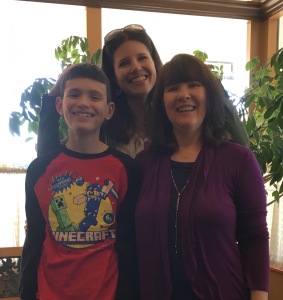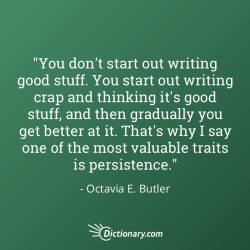My son and my mom are officially the same height.

I’m taller than they are.

But I digress.
My son has always been above average on the growth curve. Now, having just turned twelve, he’s caught up to his grandmother. He’s tall. And she’s . . . less than tall.
I may or may not have put this on her Facebook timeline.

The boy is tall, and the mom is short. And yet, they’re the same height.
The observations are accurate because the boy is still growing. For his age, he is tall. And he’ll continue along the growth curve, leveling out somewhat, until he reaches his full height. His doctor thinks that will be around 6’1″.
How does this apply to writing? I’m so glad you asked!
Consider how the growth curve looks.

Notice a sharp increase starting in infancy, then a slight leveling out starting around age 2, then a significant leveling out around age 15. No matter where a newborn starts, height-wise, the pattern applies.
 There is a growth curve with writing, and I think it would look similar to the physical growth curve, if such a convenient visual representation existed. Everyone starts writing as a brand-new writer. Stephen King wasn’t The Great Stephen King at first. He started at the beginning and had to practice and improve.
There is a growth curve with writing, and I think it would look similar to the physical growth curve, if such a convenient visual representation existed. Everyone starts writing as a brand-new writer. Stephen King wasn’t The Great Stephen King at first. He started at the beginning and had to practice and improve.
After working in a critique group for going on three years, I would say that the most profound growth a writer experiences is at the beginning of their writing life – with a big if (which I’ll get to in a minute). Unless you studied writing in college (and maybe not even then), you just don’t know what you don’t know until someone tells you. And if you’re like me, it’s a lot.
When I started in the critique group, I learned I was making several novice writing mistakes, including but not limited to: filtering, not anchoring the character in the setting, using echoes, being redundant, and overusing dialogue tags.
 After I had all that straightened out, I learned other things, like how to show emotion and how to avoid adverbs by using strong verbs.
After I had all that straightened out, I learned other things, like how to show emotion and how to avoid adverbs by using strong verbs.
You could say the number of things I had to learn dropped as I put what was taught to me into practice. Eventually, like the physical growth curve, I leveled off because there isn’t as much to learn. But here’s where the comparison ends – unlike physical growth, which eventually stops, writing growth can potentially always occur, no matter how long you’ve been doing it. The line always slopes slightly upwards.
Now, let’s get back to that big if.
 Sometimes, I work with writers who, for lack of a better description, refuse to improve. I’m not sure why they’re in the critique group. Maybe it’s to get their egos stroked. If you saw one of these writers, you’d see how week after week, suggestions, even to obvious errors, aren’t applied.
Sometimes, I work with writers who, for lack of a better description, refuse to improve. I’m not sure why they’re in the critique group. Maybe it’s to get their egos stroked. If you saw one of these writers, you’d see how week after week, suggestions, even to obvious errors, aren’t applied.
Now, it could be they’re waiting until all chapters are through the site to make revisions, but sometimes, I get this…
This is how I write. It’s my voice.
Which is when I part ways with said writer. I’m there to improve and to help others improve, not to stroke egos. I’m not interested in working with perfect writers (and for anyone in the critique group with a similar mindset, don’t worry; I’ll never be a member of the perfect writers club.)

Spoiler alert: no one is born knowing them.
Learning to write is a honing process. Like a growing child learning to walk, there’s a lot of falling down and getting back up involved. Producing a marketable book requires months, if not years, of drafting, revising, drafting, editing, and more drafting. There’s a misconception that because we all learned to write in school, anybody can write a book with little effort.
So if you’re just starting out and find the curve a bit daunting, take heart – you’re at the beginning of the curve. And if you’re past the initial slope and are starting to level out, realize there is always something new to learn around the next corner.
Where are you on the writing growth curve? If you’re past the first slope, what was your experience getting over it?



I’m at a point where I constantly question my writing ability.
LikeLike
Reblogged this on Allison Maruska and commented:
From the archives: Yep, writing has a growth curve!
In related news, the boy is an inch taller than I am now! 😬
LikeLike
Hi Allison! Per your earlier permission, I scheduled this article to be featured as a guest post on April 22nd. As usual, it has your credit/bio/link. Thanks!
LikeLiked by 1 person
Great! Thanks!
LikeLiked by 1 person
Reblogged this on The Owl Lady.
LikeLiked by 1 person
Thanks for the reblog!
LikeLike
I feel like I’m on the part of the curve where I have climbed a mountain and I paused to catch my breath feeling satisfied and look up and see there’s actually a whole mountain still to go. Hemingway is up there somewhere, and I’m down here.
LikeLiked by 1 person
That’s funny. I wonder if we’ll summit the Hemingway mountain…
LikeLiked by 1 person
Of course. Or did you mean writing? Because if you meant editing out “was” to the point of wanting to kill oneself, I’ve been near that a few times.
LikeLiked by 1 person
Same. It stops looking like a real word after a while.
LikeLiked by 1 person
Noooooo kidding.
LikeLiked by 1 person
I’m well past the first slope and am on the constant gradual incline of always learning something. And it will never end. I’ll never be “grown up!” But the hardest thing I found in that first slope is getting so much advice that I didn’t know what kind of writer I was. I took EVERYONE’s advice and critique, and ended up with a mess. And it’s not that the critiques were bad, it’s that everyone has different tastes and desires regarding stories, and I didn’t know how to choose because I hadn’t decided what kind of writer I was. For example, when I was in screenwriting school, mentors and advisors pushed me towards writing children’s comedy, and that’s where I spent the first few years of my career, but my heart was never fully in it. It was just something I was good at and there was work in it. It took me years to figure out why I was unhappy in my “dream job” — I was writing in the wrong genre. Now I write YA horror and mystery thrillers. Yeah, there are funny characters in my stories, but the stories are NOT comedies.
I guess the moral of the story is that it’s not only about learning “how” to write but “what” to write.
LikeLiked by 2 people
Excellent point. Thanks for sharing. I suppose it’s like any career choice – eventually you gotta do what best suits you.
You and Bridgett have the same observation about feedback early in our writing lives. Makes me wonder if more time needs to be spent extrapolating on that. *makes note for future post*
LikeLiked by 2 people
In my case, the hardest part of getting past the first slope was figuring out who was giving me good advice. There are people out there who speak with a tone of authority, but they are far from an expert. When I first started looking for help and feedback I was very young and naive in addition to being an inexperienced writer. I trusted people that spoke as though they knew what they were talking about because I desperately wanted to become a better writer.
I had some missteps due to taking bad advice without seeking other opinions, but I kept writing and as I wrote more I gained some confidence and a feeling in my gut when someone suggested I change something in my work that didn’t sound right. I learned to thank people for their suggestions but if I don’t wholeheartedly agree with the changes they are suggesting, I get more than one opinion before I go back and change my whole story.
LikeLiked by 2 people
That’s a great point. It’s hard to know what feedback is valid as a new writer, and there are enough know-it-alls to go around. Unless the opinion is a trusted one, I don’t make changes based on a single suggestion.
LikeLiked by 2 people